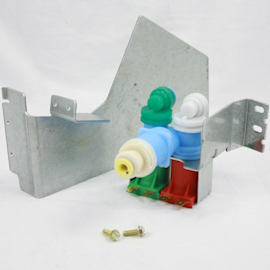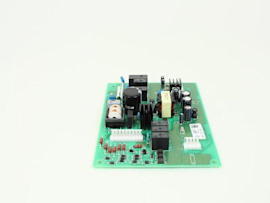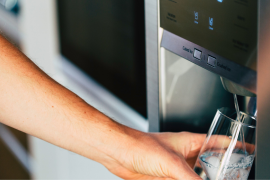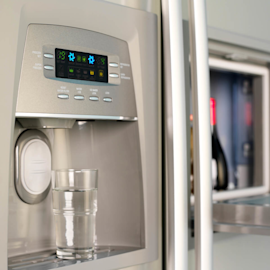Refrigerator won't cool troubleshooting video: defrost system problems


Have you noticed that the food in your refrigerator isn’t cold as it used to be? When you look in the freezer, is there frost on the back wall? Those are key signs of a problem with your refrigerator’s defrost system, problems that you can find and fix using this Sears PartsDirect troubleshooting video. Our video explains how the defrost system’s main components work, how to determine which one is responsible for the excessive frost and how to replace the responsible parts.
If you’re having other problems with your fridge, check out our DIY refrigerator repair page for more how-to guides and videos, answers to common questions and error code charts.
If you see frost on the inside back wall of the freezer compartment, and your refrigerator isn’t cooling very well, this video will help you identify the problem. Your refrigerator is supposed to automatically defrost every 8 hours or so. When something goes wrong with the defrost system, frost builds up and clogs the passages that move cool air from the freezer to the refrigerator, causing it to warm up.
Parts of the defrost system
The defrost system has four main parts:
The defrost heater melts the frost off the evaporator fins. If the heater breaks, the frost stays put.
The electronic control board starts the defrost cycle and regulates how often they are triggered. If the control fails, your refrigerator can’t defrost automatically.
The thermistor — also called the defrost temperature sensor — senses evaporator temperature and sends signals to the electronic control board. If the thermistor senses the wrong temperature, the electronic control board won’t turn on the defrost heater.
The defrost bi-metal thermostat shuts off the refrigerator defrost heater if the heater gets hot enough to damage the evaporator. If the defrost bi-metal thermostat trips to shut off the defrost heater but doesn’t reset, the defrost heater won’t turn on.
A quick check of the defrost heater shows whether the problem is with either the thermistor or electronic control board, or instead is with either the defrost heater or the bi-metal thermostat.
Check the defrost heater
First, check if the defrost heater turns on when in forced defrost mode. This easy test narrows down the cause of the problem:
If the defrost heater works in forced defrost mode, the defrost heater, defrost bi-metal thermostat and wiring in that circuit are okay, and the problem is with the thermistor or electronic control board.
If the defrost heater doesn’t work in forced defrost mode, the problem is the defrost heater, defrost bi-metal thermostat or wiring.
On this Kenmore model, press the door switch 5 times within 2 seconds to enter the forced defrost mode. The control beeps and then the defrost mode starts. (It stays in this mode for about 10 minutes. You can stop it before the time is up by unplugging the refrigerator.)
If this method doesn’t work for your model, check the refrigerator tech sheet for instructions — look for it behind the bottom front grille or taped to the back of the refrigerator.
Check whether the frost starts to melt; if so, the heater kicked on in forced defrost mode.
If the defrost system heated up in the forced defrost mode, the heater is fine. Unplug the refrigerator to exit the test mode and skip to the section called “Test the defrost heater and bi-metal thermostat.”
If the defrost heater doesn't work in the forced defrost mode, check for the uninterrupted flow of electric current — the continuity — through the defrost heater circuit from the electronic control board by following these steps:
Unplug the refrigerator, for safety.
Drop the control panel down to access the electronic control board.
Check the defrost heater circuit by putting one multimeter lead on the brown wire and the other lead on the blue wire.
If the multimeter reads about 40 ohms, the circuit has continuity, which means the defrost heater, defrost bi-metal thermostat and the wiring are okay; the problem is either the thermistor or electronic control board. Go to "Test the thermistor."
If the multimeter reads oL, the circuit doesn't have continuity. Skip to "Test the defrost heater and thermostat.
Test the thermistor
If your defrost heater circuit shows continuity, the problem is either the thermistor or the electronic control board — one of these components is keeping the electronic control board from sending current through the defrost heater circuit. To find out which it is, test the thermistor. (You might need the tech sheet to decode the test result. Look for it behind the bottom front grille or taped to the back of the refrigerator, if you didn’t use it when checking the defrost heater.)
With the refrigerator still unplugged, remove the back freezer panel.
Take the temperature inside the freezer. You’ll need it for the next step.
Put one multimeter lead on each of the gray/white wires in the harness plug. The multimeter should measure around 63,000 ohms when the freezer temperature is at 0 degrees. If the freezer isn’t at 0 degrees, check the chart on the tech sheet for what the resistance reading should be for the temperature of the freezer. If the thermistor resistance reading is off by more than 10 percent, replace the thermistor. This video demonstrates how to replace a thermistor.
If your thermistor checks okay, you'll probably need to replace the electronic control board and you don’t need to continue with further troubleshooting. This video shows how to replace the control board.
Test the defrost heater and thermostat
Do this section only if you jumped here from “Check the defrost heater.”
If you didn't measure continuity through the heater circuit, then the problem is either a broken defrost heater or a defective bi-metal thermostat. Here’s how to pinpoint the problem.
First, check the defrost heater and replace it if it’s visibly damaged.
If your defrost heater doesn't show damage, follow these steps to test it:
Unplug the refrigerator.
Unplug the heater from the wire harness.
Put the red multimeter lead on one of the heater wires and the black meter lead on the other. The multimeter should measure about 40 ohms of resistance through the defrost heater. If not, replace the defrost heater. This video explains how to replace a refrigerator defrost heater.
If the defrost heater is okay, check the bi-metal thermostat for continuity. Put one multimeter lead on the light blue wire in the harness plug and the other lead on the blue wire of the defrost bi-metal thermostat.
If it reads oL, the thermostat is broken. This video shows how to replace a refrigerator thermostat.
If the meter reads near 0 ohms, the thermostat has continuity and is okay. The problem is a broken wire. This video shows how to find a broken wire.
Most common symptoms to help you fix your refrigerators
Choose a symptom to see related refrigerator repairs.
Main causes: blocked vents, defrost system problems, evaporator fan failure, dirty condenser coils, bad sensors, condens…
Main causes: damaged door seal, faulty defrost sensor or bi-metal thermostat, broken defrost heater, bad defrost timer o…
Main causes: jammed ice cubes, broken ice maker assembly, dirty water filter, kinked water line, bad water valve, freeze…
Main causes: control board or cold control failure, broken compressor start relay, compressor motor failure, defrost tim…
Main causes: leaky door gasket, defrost system failure, evaporator fan not running, dirty condenser coils, condenser fan…
Main causes: blocked air vents, compressor problems, condenser or evaporator fan not working, control system failure, se…
Main causes: water valve leaking, frozen or broken defrost drain tube, overflowing drain pan, cracked water system tubin…
Things to do: clean condenser coils, replace the water filter, clean the interior, adjust doors to prevent air leaks, cl…
Most common repair guides to help fix your refrigerators
These step-by-step repair guides will help you safely fix what’s broken on your refrigerator.

How to replace a refrigerator water valve
Replace the water valve that feeds water to the ice maker and water dispenser if it no longer controls the flow of water…

How to clean refrigerator condenser coils
Help your refrigerator run more efficiently by cleaning the condenser coils. It's easy and takes just a few minutes.…

How to replace a refrigerator temperature control board
If the temperature in your refrigerator doesn't match the temperature you set, the problem could be the temperature cont…
Effective articles & videos to help repair your refrigerators
Use the advice and tips in these articles and videos to get the most out of your refrigerator.

No matter what style Maytag refrigerator you have, we can walk you through replacing the water filter.…

Learn about all the convenient features on our Sears PartsDirect website that make your parts purchases easier.…

If your refrigerator's ice maker isn't producing as much ice as it should, or water is flowing poorly from the dispenser…
